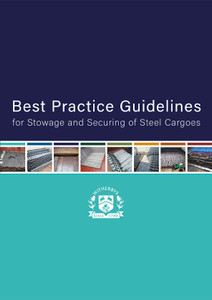

Safe Handling and Transport of Solid Bulk Cargoes - Model Course 1.45
The course is intended for seafarers on board ships carrying solid bulk cargoes, and personnel involved in the transport chain of solid bulk cargoes, such as officials of the competent authorities, port authorities, port terminals, mine operators, shippers, technicians and shipping company?s representatives, as well as all personnel involved in the assessment of acceptability of consignments of solid bulk cargoes according to the IMSBC Code.
The objective of this course is to raise trainee awareness of the dangers that may occur during the loading, carriage and unloading of solid bulk cargoes. On successful completion of the course, trainees should be able to assess acceptability of consignments for safe shipment, observe ship and port security regulations and supervise the operation process of cargo following regulations in the IMSBC Code. Evaluation methods are also outlined and include multiple choice and objecting testing.
After the adoption of the International Convention on Standards of Training, Certification and Watchkeeping for Seafarers (STCW), 1978, the International Maritime Organization (IMO) recognized the need to provide guidance to maritime academies and training institutes to develop model training courses that are in compliance with STCW Convention requirements for certification of seafarers and other IMO instruments. The IMO model course programme was introduced to provide guidance with a view to supporting maritime training providers and to assist maritime administrations responsible for the approval of STCW courses and maritime training.
The model course programme has been a long term success and the IMO has developed a number of model courses to help in effectively implementing the STCW Convention, the Knowledge, Understanding and Proficiency (KUP) requirements of the STCW Code and other IMO instruments. The key to this success is adherence to the requirements of the Conventions while, at the same time, these requirements are supplemented with industry best practices so that seafarers can be confident in carrying out the duties on
board. The success of a course depends on the skills and competence of individual course facilitators. As part of the model courses, the IMO has also developed guidance on the implementation of the model course, which may help those less experienced facilitators to make each course a success.
Whilst aiming to uniformly implement the requirements of the STCW Convention and Code and other IMO instruments, the model course programme is designed to provide flexibility to allow training providers to adjust the course programme to the needs of seafarers and trainees, based on their previous work experience and education.
IMO model courses are for the purpose of guidance only, and are not to be regarded as an official interpretation of IMO instruments. They can be of assistance to administrations to facilitate the process of approval of STCW course programmes, and could be used by maritime academies and training providers in the development of courses that satisfy the requirements set out in the STCW Convention and STCW Code, and other IMO instruments.
This model course was validated by the IMO Sub-Committee on Carriage of Cargoes and Containers at its sixth session (9 to 13 September 2019). It is hoped that the course makes the navigation of ships safer.
Foreword
Introduction
Part A: Course framework
Part B: General outline
Part C: Detailed outline
Part D: Instructor manual
Part E: Evaluation and Assessment
Appendix I: Instructor feedback on model course
Appendix II: Guidance on the implementation of IMO model courses
IMO
As a specialised agency of the United Nations, the International Maritime Organization (IMO) is the global standard-setting authority for the safety, security and environmental performance of international shipping. Its main role is to create a regulatory framework for the shipping industry that is fair and effective, universally adopted and universally implemented.
In other words, its role is to create a level playing field so that ship operators cannot address their financial issues by simply cutting corners and compromising on safety, security and environmental performance. This approach also encourages innovation and efficiency.
Shipping is a truly international industry, and it can only operate effectively if the regulations and standards are themselves agreed, adopted and implemented on an international basis. And IMO is the forum at which this process takes place.
- Number of Pages:
- 0
- ISBN:
- 9789280117226
- Published Date:
- January 2019
- Binding Format:
- Paperback
- Book Height:
- 0 mm
- Book Width:
- 0 mm
- Author:
International Maritime Organization
- Publication Date:
- January 2019



